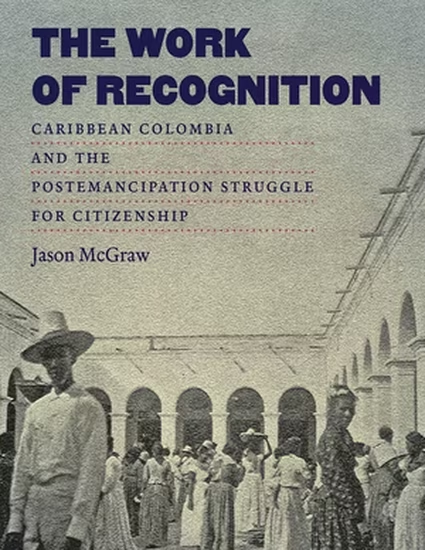
Article
The Work of Recognition: Caribbean Colombia and the Postemancipation Struggle for Citizenship (Review)
The American Historical Review
(2015)
Abstract
In a similar vein to several other countries in Spanish America, Colombia’s final abolition of slavery came in the mid-nineteenth century. A May 1851 law made abolition effective the first day of 1852. As Jason McGraw’s The Work of Recognition: Caribbean Colombia and the Postemancipation Struggle for Citizenship suggests, one of the major challenges thereafter was turning the recently proclaimed formal freedom and equality of all Colombians under the law into a tangible reality. Unlike plantation societies nearby, manumitted slaves in Colombia were not denied suffrage, neither were they forced to move or required to post bonds as a condition for their liberation. Still, the experiences of the former slaves and subsequent generations of colored peoples in the country’s Caribbean region illustrate that, far from smooth, the actual recognition of full citizenship rights for all Afrocolombians was a protracted and deeply contentious process. Throughout the transition, people of color participated actively to challenge social discrimination and determine their historical destiny as fully empowered members of the republic, true citizens.
The study, a combination of mostly political and some intellectual history, begins with an overview of the politics of emancipation. This was a process triggered by the weakening of slavery due to the widespread flight of slaves over time; and it was ultimately led in congress by the newly established Liberal party with support from “democratic societies,” political clubs it formed in various regions. State officials, generally linked to the party, also staged public manumission ceremonies all over the country. These choreographed spectacles broadcasted the republican and egalitarian ethos Liberals seemed eager to promote at the moment. A couple of years later, in 1853, Liberals also managed to pass a constitution providing universal manhood suffrage, a mechanism blacks and mulattoes would use to demand further political participation and recognition.
Then, McGraw addresses the civil war fought shortly thereafter (1859–1862) to, as per the author, determine “the democratic legacy of emancipation” (13). Tactically presented by Conservatives as a true race war where machete-wielding gangs of black men went out calling for “death to the whites,” the conflict was more broadly over suffrage, federalism, and partisanship. Some men of color gained upward social mobility and recognition through participation in the rebel armies. However, although the Liberals eventually won the conflict, during its aftermath the federalist regime put into place literacy and property requirements for participation in the electoral process that denied Afro-descended peoples the right to vote in those states (several paradoxically under Liberal control).
Next, the book discusses further conflicts over labor rights, education and literary attainment, and popular participation in politics. Labor disputes are illustrated through the case of the unruly bogas, crews of black men operating boats carrying cargo and passengers up and down the strategic Magdalena River, the main artery of communication through the Caribbean region and the country’s interior. Besides a discussion of educational reforms in the 1860s and 1870s, the careers of black lawyer Luis A. Robles and military captain and poet Candelario Obeso serve to document some of the tensions over intellectual and cultural accomplishment, matters amply debated in the public sphere. The author examines closely the writings of Obeso, in particular, to show the way this remarkable black intellectual relied on popular costumes and black speech to engage his white lettered compatriots in public debate in an attempt to advance an antiracist agenda and thus the cause of people of color. As for popular politics, the book addresses demands for representation, tax and land protests, challenges to religious authorities, disputes over marriage and legitimacy, and partisan squabbles involving coastal Afrocolombians.
Finally, the study closes with an analysis rich in information on the role of religion and the Catholic Church, of the Regeneration, an authoritarian political and cultural regime installed in the 1880s, which disenfranchised illiterate and property-less people, many of them Afrocolombians. Amidst deteriorating social conditions and a growing economic crisis, some popular groups in the Caribbean, made up of market women, bogas, peasants and journeymen, responded to it with messianic mobilization and armed rebellion. The book then devotes its last chapter to a reconsideration of the Thousand Days’ War (1899–1902). The conflict became a further opportunity for disenfranchised peoples to demand public recognition; however the rebels’ defeat and thus the war ultimately did not contribute to improving their social or political circumstances. In the decades following the war, even today, Afro-Colombians in the Caribbean region and elsewhere continue to confront considerable violence, poverty, and all forms of exclusion. Still, their struggles for recognition have not ceased either.
Relying on an abundant series of government documents and a rich array of other primary sources from several local, regional, and national archives, both civil and ecclesiastical alike, McGraw’s tightly argued book joins a series of distinguished studies on various aspects of race relations in Colombia, in particular the works by Nancy Appelbaum, Jaime Arocha, Aline Helg, Marixa Lasso and Alfonso Munera. It represents another major contribution to the regional history of the country’s Caribbean region, adding to the work of Orlando Fals Borda, Adolfo Meisel Roca, Eduardo Posada-Carbó, and Sergio P. Solano. Further, the study also enriches the historiography on the post-emancipation experience of various Latin American countries by, among others, George Reid Andrews, Robert Cottrol, Alejandro de la Fuente, and Rebecca Scott. It shall become required reading for those interested in Colombian history and a standard text for comparative graduate seminars on race relations and post-emancipation politics in the Americas more generally.
Keywords
- Carribean,
- Colombia,
- Postemancipation,
- citizenship
Disciplines
Publication Date
December, 2015
DOI
https://doi.org/10.1093/ahr/120.5.1940
Citation Information
Victor Uribe-Uran. "The Work of Recognition: Caribbean Colombia and the Postemancipation Struggle for Citizenship (Review)" The American Historical Review Vol. 120 Iss. 5 (2015) p. 1940 - 1941 Available at: http://works.bepress.com/victor-uribe-uran/47/
